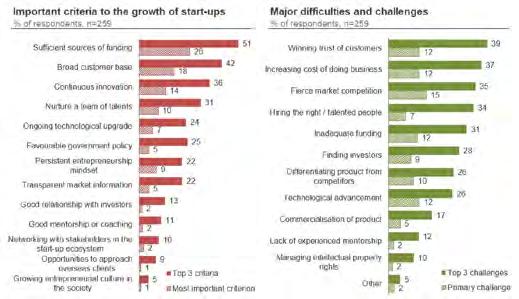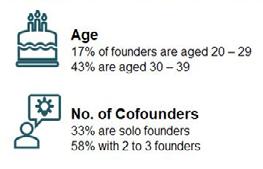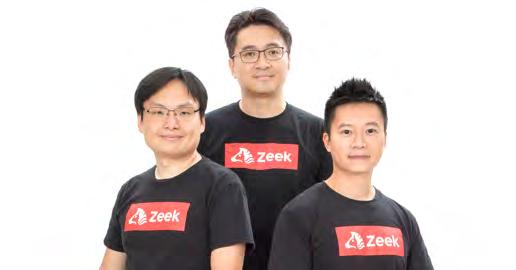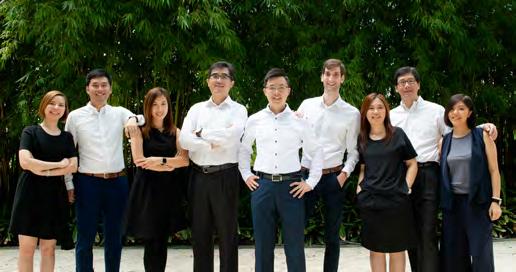
11 minute read
Finance and education technology startups lead Hong Kong’s funding race
Investors are also showing increasing interest in new firms focused on artificial intelligence and biotech.
Fintech continues to be the top performing startups in 2021
Fintech startups made up more than half of Hong Kong Business’ 2021 Hottest Startups, but logistics startup Zeek tops our list with $116.5m (US$15m) funds raised in a pre-Series A funding round led by SF Holding, Chinachem Group, Philippines KHO Group family, and Henderson Land chairman and managing director Dr. Lee Ka Kit in private investment as well as the Innovation and Technology Venture Fund Corporation of the Hong Kong SAR Government and several others.
Coming in second is insurtech startup Coherent that raised $108.6m (US$14m) in Series A funding round led by Cathay Innovation with participation from Franklin Templeton. Taking third place is ICW, which stands for International Compliance Workshop, a compliance supply chain platform which focuses on the testing, inspection and certification (TIC) industry. The startup helps consumers who are not clear about the flow and procedure for the TIC operation. ICW raised $44.6 (US$ 5.75m) in Series A funding round led by Infinity Ventures Partners with participation from Integrated Capital and existing investors MindWorks Capital and the Innovation and Technology Venture Fund of the Hong Kong Special Administrative Region (HKSAR) Government.
Other startups in the list are Stratrys ($38.7m), Reap ($38.7m), Avant Meats ($24m), Linear Finance ($13.9m), and Neufast ($5.8m). Overall average funding was at $49.63m.
Fintech and edtech cornerstone for Hong Kong
It is no surprise that fintech continues to be the top performing startups in 2021, making up more than half of the 2021 Hottest Startups list.
Investors will increase their deployment into AI and biotech, especially those startups that focus on AI-related drug discovery and development
In an inclusive interview with Hong Kong Business, Hong Kong Venture Capital and Private Equity Association’s (HKVCA) research and policy director Alfred Lam said that fintech and edtech are essential segments in Hong Kong.
“I do think investors will increase their deployment into AI and biotech, especially those startups that focus on AI-related drug discovery and development,” Lam also added.
Recently, Singapore-based Sea Group launched Sea Capital, a venture fund aimed in investing in tech startups for the next few years. The group has allocated an initial US$1b for the fund.
Meanwhile, a Hong Kong VC firm SIG Investments participated in a funding round amounting to $31m with India-based edtech startup Doubtnut.
Meanwhile, VCs may soon get more competitions. “First, corporates and family offices are increasing their involvement as well as commitment in local startups. Second, I am expecting some RMB-domiciled VC fund houses will open their offices in Hong Kong and leverage the HK LPF regime to establish USD funds,” Lam predicted.
Slow movement in startup ecosystems continues
In 2020, the combination of social unrest and economic halt brought by the COVID-19 pandemic made venture capital (VC) firms hold back in injecting funds into startups which reflected in the sluggish movements of the startup ecosystem in Hong Kong.
HKVCA’s Lam said Hong Kong investment volumes dropped from 75 to 56. Investments totaled $1.27b in 2020 compared to $1.29b in 2019.
Meanwhile, Hong Kong Trade Development Council (HKTDC) reported that local startups have been growing. According to HKTDC, between 2018 and 2020, the number of local startups rose 28% to 3,360, employing 10,688 people. The lionshare of the growth was centered around financial technology, e-commerce/ supply chain management/logistics technology, and professional and consultancy services.
However, in terms of performance, HKTDC said there’s “room for improvement” as several startup research institutes did not even place Hong Kong amongst its list of top five startup ecosystems in the Asia Pacific.
Startups to need more support from government and private sector
In a recent study by the council, Hong Kong entrepreneurs are very satisfied with the social infrastructure and market accessibility for the biotech and healthcare startup industry the most. The
Startup growth criteria

Source: HKTDC Start-up Survey 2020
industry is followed by new retail and hardware and IT industries. However, overall, there is less general satisfaction with funding and support.
“Rather than monetary support, they would prefer to receive more non-monetary support from the government and the private sector, such as marketing and the adoption of local innovative products and services. This non-monetary support can help Hong Kong start-ups tide themselves over during the pandemic and bolster their long-term growth,” HKTDC said.
The HKTDC also added that startups continue to be “engines of economic growth”, with economies around the world sparing no effort to nurture unicorn companies in a bid to propel the development of the new economy.
Challenges in Hong Kong’s startup ecosystem
HKTDC Research conducted surveys and in-depth interviews with local startups and found out the top three challenges they faced.
The 39% of those surveyed placed winning customer trust as the biggest hurdle they had to face. Second is increasing the cost of business (37%) followed by fierce market competition (35%)
The survey also showed what local startups think is important for growth. More than half (51%) said having sufficient source of funds as the top factor for growth. This is followed by having a broad customer base (42%), continuous innovation (36%), and nurturing a team of talents (31%).
However, HKTDC Research said that since startups mainly aim to provide innovative products and solutions and the nature of business varies greatly between different companies, the criteria that are most important to the growth of startups also differ between different industries.
“For instance, companies in new retail (33% of respondents) and innovative services (20%) place special emphasis on building a broad customer base, whilst those in industries with higher technological requirements, such as biotechnology and healthcare (20%), information technology and hardware manufacturing (16%), and the new economy (15%), find continuous innovation indispensable,” HKTDC added.
Young business leaders take charge
As Hong Kong’s startup ecosystem grows, business leaders are getting younger, according to a survey done by HKTDC.
The survey found that the majority of Hong Kong entrepreneurs are relatively young and highly educated. The 43% of founders of the startups polled are aged between 30 and 39, whilst 17% are aged between 20 and 29. Around 90% are university graduates and 49% have obtained a master’s degree or a doctorate.
HKTDC said that during the in-depth interviews, some respondents spoke about taking part in entrepreneurship competitions whilst they were still at university. Some had won their startup capital as a result of winning these competitions.
In other words, some started their own business even before they graduated.
The survey also found out that 43% of entrepreneurs started their business with less than $300k, 38% invested over $1m, and only 19% put in as much as HK$50 million.
“The level of startup funding largely depends on the nature of the business. The startups in the survey that had invested over HK$1 million were mainly engaged in information technology and hardware manufacturing, biotechnology and health, and the new economy; whilst the level of startup funding of the majority (62%) of innovative services companies was less than HK$300,000,” HKTDC said.
The startup ecosystem in Hong Kong may have faced a great challenge in the past few years, however, HKVCA’s Lam saw some cases where well-developed crisis management helps them through crises.
“If startups can show their capability in dealing with unprecedented challenges, they may be able to raise additional funding in 2021 and beyond,” Lam said.
Qualities of Hong Kong entrepreneurs


1. Zeek 2. Coherent

Founders: KK Chiu, Vincent Fan, and Cliff Tse Funding: Raised $116.5m (US$15m) in a pre-Series A funding round led by SF Holding, Chinachem Group, Philippines KHO Group family, and more. Start of operations: 2019

Zeek provides data-driven intelligent logistics technology to merchants with solutions spanning across online order management, delivery capacities management, big data analytics, and O2O operations enhancement for an array of industries. Zeek focuses on assisting merchants to achieve digital transformation for long-term business development. Currently, Zeek plans to expand its ZeekDash, its point-topoint O2O delivery services, to Singapore and Vietnam and will soon be entering the markets in Southeast Asia such as Taiwan, Philippines, and Indonesia.
3. ICW
Founder: John Brisco Funding: Raised $108.6m (US$14m) in Series A funding round led by Cathay Innovation with participation from Franklin Templeton. Start of operations: 2018
Coherent is an insurtech startup that helps insurers leverage technology to do things faster, smarter, and simpler by making insurance more personalised and digital for customers and distributors. Its platforms help insurers across four key stages of the insurance business: product development, sales enablement, customer acquisition and engagement, and policy management. The company has recently launched a campaign around its core proprietary technology, Spark, which is a logic and rules engine that Coherent developed, offering API services, data storage, and cloud provisioning.
4. Stratrys

Founders: Gary Lam, Raymond Lee, Bonnie Lui, and Paul Yao Funding: Raised $44.6 (US$ 5.75m) in a Series A funding round led by Infinity Ventures Partners with participation from Integrated Capital and existing investors. Start of operations: 2016

ICW, which stands for International Compliance Workshop, is a compliance supply chain platform which focuses on the testing, inspection and certification (TIC) industry. The startup assists consumers and help them understand processes, especially for those who are not clear about the flow and procedure for the TIC operation. The company is formed by domain experts with over 60% of the team members coming from the TIC industry. They boast a comprehensive knowledge on the regulatory requirements of different products and different countries. Founder: Bertrand Theaud Funding: Bertrand Theaud recently raised $38.7m (USD$5m) from their Series A funding round led by an angel investor. Start of operations: 2018
Seeing an opportunity for a payment platform in Southeast Asia, Bertrand Theaud founded Stratrys to address market demands. Stratrys payment services combine digital experience with a human touch. It is a payment platform that aims to humanize the business payment experience through transparency, removing the mystery of payments and their fees from A to B. The company offers competitive transfer fees and foreign exchange fees that are low enough to encourage regular usage of its platform for payment of any invoice for businesses of all sizes. Currently, the company is developing to deploy a Statrys Payment Card, powered by Mastercard, so clients can directly use their account online.
5. Reap 6. Avant Meats

Founders: Daren Guo and Kevin Kang Funding: Raised $38.7m (US$5m) in a seed funding round led by Global Founders Capital, Bertelsmann Asia Investments, Index Venture, Fresco Capital, and Hustle Fund. Start of operations: 2018

Fintech startup Reap is a payment solutions provider for SMEs that was started by young businessmen who knew each other since middle school. The company aims to help businesses across Asia access digital tools via a cloud-based platform to better manage the challenges in cash flow management. Reap digitises day-to-day financing solutions and provides quick access to alternative sources of liquidity to facilitate smoother cash flow and increased capital efficiency for small businesses. They are currently working on linking together all aspects of payments that their customers process.

7. Linear Finance
Founders: Kevin Tai and Drey Ng Funding: Raised $13.96m (US$1.8m) in a seed funding round led by NGC Ventures, CMS Holdings, Hashed, Genesis Block, and Kenetic Capital. Start of operations: 2020
Linear Finance is a cross-chain compatible, decentralised delta-one asset protocol that can quickly and cost-effectively create, trade and manage liquid assets (Liquids) and creative thematic Digital Traded Funds. Its boasts its products such as Linear Buildr, and Linear swap, the company’s custom built swap functionality that helps save gas fees and allows composability of LINA tokens across different blockchains. The startup seeks to resolve issues existing in synthetic asset protocols such as poor usability, structural inefficiencies, and high systemic risk. Founders: Carrie Chan and Mario Chin Funding: Raised $24.05m (US$3.1m) in a funding round led by China Venture Capital, Lever VC, AngelHub, ParticleX, CPT Capital, Loyal VC, 208 Seed Ventures, and Artesian Start of operations: 2018
Headquartered in Hong Kong, Avant Meats is a cultivated meat technology startup that aims to become a global leader in cellular agriculture technology. The company cultivates fish products without the need of killing fishes for more sustainable GMO-free and pollutant-free meat. The company makes sure that its products are free from heavy metal, plastic microparticles, antibiotics and other marine pollutants. Avant meats makes sure they cultivate what they need to avoid wastage of resources. Their pilot products focus on fish maw and sea cucumbers that have a large market in Asia.
8. Neufast
Founder: Agnes Wu Funding: Neufasthas over $5.8m ($750k) in funding after a seed funding round led by women-focused, venture capital firm Her Capital. Start of operations: 2018
Using a video interviewing software, HR-tech company Neufast is able to assess candidates in multiple languages within a single interview. Using B2C solution, the platform NeuCareers helps job seekers understand their personalities and job fit, allowing them to succeed in a video-based virtual interview process using a combination of AI and techniques by the company’s HR experts. Its services will also help companies in their hiring process and will help find the right candidates for a better job fit whilst providing an engaging interview experience.










